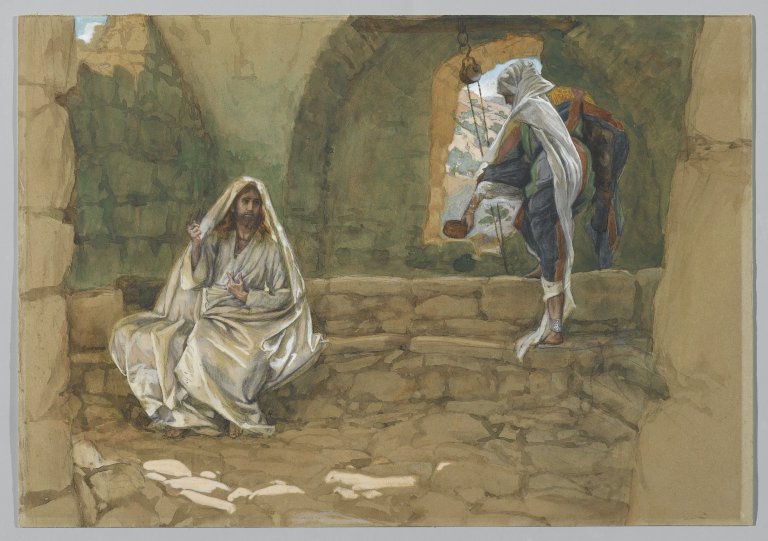This Samaritan woman well understands the realities of attitudes in her day, and reacts with disbelief.
The Samaritan woman said to him, “You are a Jew and I am a Samaritan woman. How can you ask me for a drink?” (For Jews do not associate with Samaritans.)
This editorial comment, “For Jews do not associate with Samaritans,” tells us something about the audience the gospel of John was written for: Many of them were not Jews. If they had been, this comment wouldn’t have been necessary.
As her words indicate, the woman at the well naturally felt quite defensive. By speaking first, and expressing a need, Jesus puts himself in a vulnerable position; she could ignore him, or refuse his request. Putting her in control of the encounter increases the her sense of safety. This Jewish man, rather than being haughty and superior, has requested her help. That emboldens her to ask him how he can dare to be vulnerable with her.
Now that Jesus has her full attention, he tells her about the water he has to offer.
Jesus answered her, “If you knew the gift of God and who it is that asks you for a drink, you would have asked him and he would have given you living water.”
A moment earlier, he had asked her for water. Now he claims to have water for her. He has piqued her interest.
“Sir,” the woman said, “you have nothing to draw with and the well is deep. Where can you get this living water?”
This woman, this Samaritan, sees that he cannot be talking about this well. Yet offers her water. Not the unmoving water pooled in the bottom of the well, but living water. Living water was an expression Jews used to describe fresh, pure, flowing water, such as water in a stream or bubbling from a spring. Humans can dig wells, but living water comes from God, in the form of rain, or snow, or from a spring. Only living water could be used for ritual cleansing. This well offers nothing so marvelous, even though associated with the legendary Jacob himself. This leads her to a shocking conclusion.
“Are you greater than our father Jacob, who gave us the well and drank from it himself, as did also his sons and his livestock?”
This is a rhetorical question, a question which implies an answer. In this case, that Jesus’ offer exceeds the accomplishment of Jacob. Water from Jacob’s well gives life. Water from this strange Jewish man who talks to Samaritan women gives eternal life! And he offers it to her!
Jesus answered, “Everyone who drinks this water will be thirsty again, but whoever drinks the water I give them will never thirst. Indeed, the water I give them will become in them a spring of water welling up to eternal life.”
She still does not fully comprehend what Jesus is saying to her.
The woman said to him, “Sir, give me this water so that I won’t get thirsty and have to keep coming here to draw water.”
As so many of us do, at first she misunderstands Jesus’ offer, taking it too literally, seeing it only in terms of her daily chores. If she receives this water and never thirsts, it will eliminate her daily trips to Jacob’s well.
In the previous chapter of the gospel of John, Jesus told Nicodemus he needed to be born again, born from above, and Nicodemus wanted to argue about the possibility. He could have said, “I want to be born again. Help me.” But he did not. This Samaritan woman does not argue whether the Jesus has the water he claims. She simply requests it. Jesus longs to reveal himself to her.
Nicodemus had said, “We know you are teacher who has come from God.” The Samaritan woman is on the verge of discovering that Jesus is much more. Only a few shreds of doubt remain in her mind, and Jesus is about to remove those.
He told her, “Go, call your husband and come back.”
“I have no husband,” she replied.
The simple fact that she comes to draw water alone in the heat of the day would lead one to surmise that the other women did not like her for some reason. She has endured condemnation and ridicule before. It would be a pity if her encounter with this apparently kind stranger ended on a sour note, but she is used to men disappointing her. So she answers him truthfully, but carefully. That’s what makes his reply so astonishing.
Jesus said to her, “You are right when you say you have no husband. The fact is, you have had five husbands, and the man you now have is not your husband. What you have just said is quite true.”
This detail alone gives the story relevance to our day. Women with multiple husbands and divorces, cohabiting with someone not their spouse can be found in every large city today, and in many small towns as well. Yes, his recounting of her multiple failed marriages surprises her, for how could a stranger know such detail? But he offers no censure, only affirmation: “You are right . . . . What you have said is quite true.” He offers her living water, though he has nothing to draw it with, he admits to being one greater than Jacob, somehow he knows about her failed relationships with men, and he does not condemn her! Her relief must be almost overwhelming. She feels safer with this all-seeing Jewish man than she has ever felt with anyone. How do we know? Because she has a question she has never dared ask anyone, and she asks it now.
“Sir,” the woman said, “I can see that you are a prophet. Our ancestors worshiped on this mountain, but you Jews claim that the place where we must worship is in Jerusalem.”
Understand, in those days very very few ever changed their religion, because it was tied up with family, with ethnicity, with loyalty one’s people and nation. Besides, who would have her? her Samaritan neighbors despised her. How much more would they hate her if she converted to Judaism? And as a Samaritan woman without a husband, virtually all Jews would scorn her interest in their religion, both because she was Samaritan and because she was disgraced.
But apparently she had always wondered. “Does which mountain you worship on make such a difference?” Again, both Samaritans and Jews would have reviled her for even thinking such a thing. But here she had found a prophet, who could see her for who she was, for what she aspired to be, rather than whose daughter she was, and how many men had rejected her. Here was her one chance to ask the question that has been bothering her. And Jesus answer speaks to the deepest desires of her heart.
“Woman,” Jesus replied, “believe me, a time is coming when you will worship the Father neither on this mountain nor in Jerusalem.
You Samaritans worship what you do not know; we worship what we do know, for salvation is from the Jews.
Yet a time is coming and has now come when the true worshipers will worship the Father in the Spirit and in truth, for they are the kind of worshipers the Father seeks. God is spirit, and his worshipers must worship in the Spirit and in truth.”
His answer? “You get it,” he says to her. “The time will come when mountains don’t matter.” To the extent they do matter, the Samaritans are confused (worship what they do not know), and the Jews are correct (worship what we know; salvation is from the Jews). “But soon, in fact already, it’s people just like you God is looking for. People who understand that God is a spirit, He is not chained to one mountain or another. He wants people who understand that and worship Him for Who He is!”
Read other posts in the “Matriarchs and Prophets” series.









